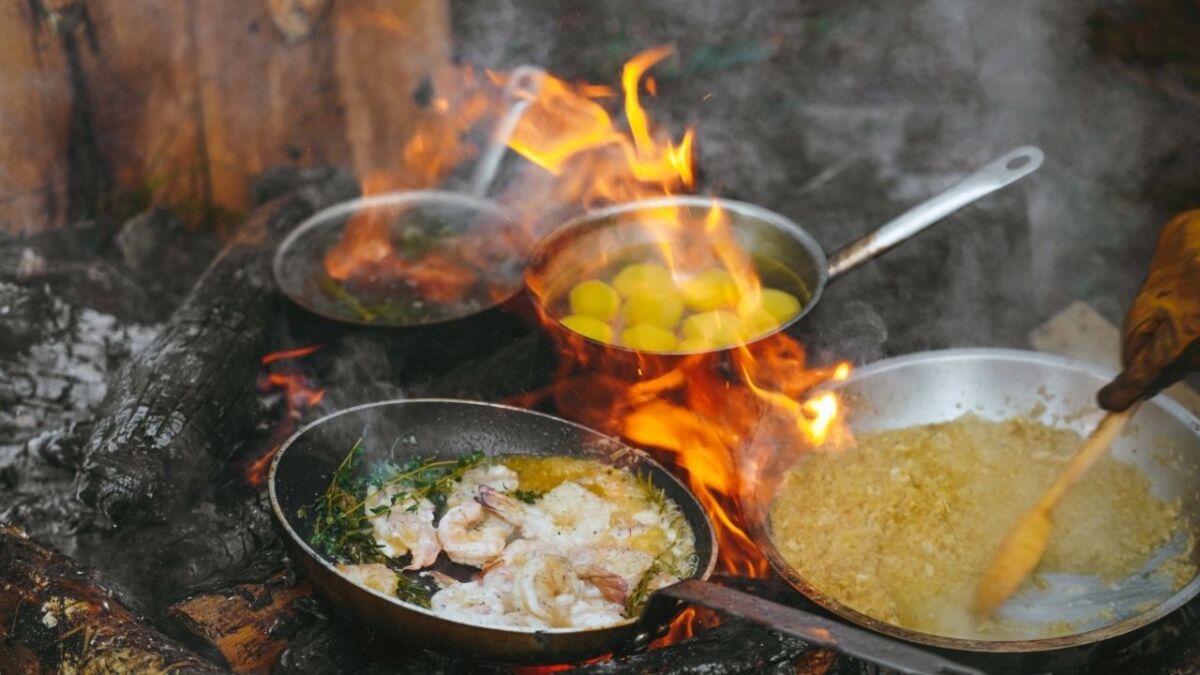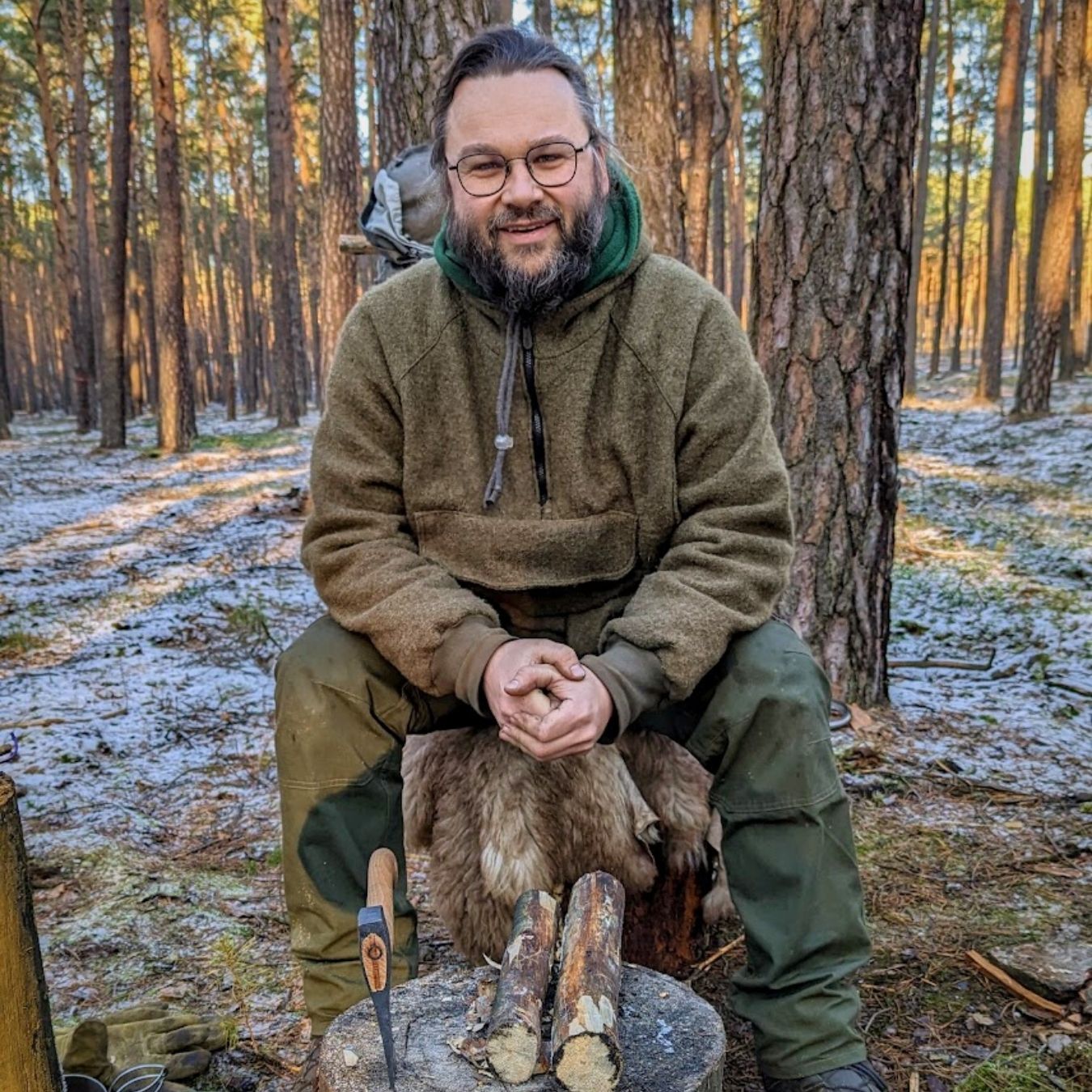
food
Noun
Meaning
Food is a crucial element in the world of survival, bushcraft, and outdoor activities. It refers to any edible substance that provides nourishment and sustenance for the body. In the context of survival, food plays a vital role in maintaining energy levels, promoting physical strength, and ensuring overall well-being. Whether you're camping, hiking, or exploring the wilderness, having an adequate supply of food is essential for survival. It is important to choose lightweight, non-perishable, and nutrient-dense food options that are easy to carry and prepare. Proper food planning and storage are key skills for any outdoor enthusiast.

Examples
„I love going on wilderness adventures and practicing bushcraft skills. One of the most important aspects of survival is ensuring you have enough food to sustain yourself.“
„When I go camping, I always make sure to pack enough food to last me for the entire trip.“
„In a survival situation, finding and foraging for food becomes crucial.“
„I remember one time when I was out in the wilderness, I had to rely on my knowledge of edible plants to find food.“
„It's amazing how resourceful you can become when you're hungry and need to find food to survive.“
Origin
The word "food" originates from the Old English word "fōda," which means nourishment or sustenance. It can be traced back to the Proto-Germanic word "fōdō," which has the same meaning. The word has its roots in the Proto-Indo-European word "pa-," which means to feed or graze.
Throughout history, the concept of food has evolved alongside human civilization. In ancient times, food was primarily obtained through hunting, gathering, and foraging. As societies developed agriculture, food production became more organized, leading to the cultivation of crops and the domestication of animals.
In modern times, food has become a complex industry, with various methods of production, processing, and distribution. The advancements in technology and transportation have made it possible to access a wide variety of food from different parts of the world.
Food plays a crucial role in survival, providing the necessary nutrients and energy for our bodies to function. It is not only a means of sustenance but also a source of pleasure and cultural identity. The way we prepare, cook, and consume food varies across different cultures and regions.
As a survivalist, understanding the importance of food and knowing how to procure, prepare, and preserve it in the wilderness is essential. It involves skills such as hunting, fishing, foraging, and cooking over an open fire. Knowing which plants and animals are safe to eat and how to properly store food can make a significant difference in a survival situation.
Synonyms
Nourishment, Provisions, Rations, Fare, Victuals, Edibles, Sustenance
Antonyms
Hunger, Starvation, Famine, Malnutrition, Deprivation, Fasting, Abstinence, Diet
Relatives
Nutrition, Nourishment, Provisions, Rations, Edibles, Fare, Sustenance
Historical and cultural importance
Food is an essential aspect of survival and has played a significant role in human history and culture. Throughout the ages, the way we obtain, prepare, and consume food has evolved, reflecting the advancements in technology, societal changes, and environmental factors.
In ancient times, food gathering and hunting were the primary means of sustenance. Our ancestors relied on their knowledge of edible plants, hunting techniques, and the seasonal availability of food sources. This deep connection with nature and the land shaped their understanding of survival and the importance of food security.
As civilizations developed, agriculture emerged as a revolutionary practice. The ability to cultivate crops and domesticate animals allowed for a more reliable and sustainable food supply. This shift from a nomadic lifestyle to settled communities marked a significant turning point in human history, leading to the development of complex societies and the rise of civilizations.
Food has also played a crucial role in cultural traditions and rituals. Different regions and communities have their unique culinary practices, reflecting their geographical location, climate, and available resources. Food has been used to celebrate festivals, mark important milestones, and bring people together in social gatherings.
In modern times, the industrialization of food production and the globalization of culinary traditions have further shaped our relationship with food. However, there is a growing movement towards reconnecting with nature, sustainable farming practices, and the appreciation of local and traditional food cultures.
Understanding the historical and cultural significance of food helps us appreciate its importance beyond mere sustenance. It reminds us of our deep-rooted connection with nature, the diversity of human experiences, and the role food plays in shaping our identities and communities.
More information about the term food
Food: Essential for Survival in the Wild
When it comes to survival in the wild, one of the most crucial aspects to consider is food. In order to sustain yourself and maintain your energy levels, it is essential to have a good understanding of the different types of food sources available in the wilderness. Let's explore some of the key aspects of finding, preparing, and consuming food in a survival situation.
Finding Food in the Wild
When you find yourself in a survival situation, it's important to know where to look for food. Familiarize yourself with the local flora and fauna, as well as the edible plants and animals in the area. Look for signs of animal activity, such as tracks or droppings, which can indicate potential food sources. Additionally, learning basic foraging skills can help you identify edible plants and berries.
It's also important to be aware of potential hazards and avoid consuming poisonous plants or contaminated water sources. Always err on the side of caution and consult reliable sources or seek professional guidance if you are unsure about the edibility of a particular plant or animal.
Preparing and Cooking Food
Once you have found a suitable food source, it's time to prepare and cook it. Depending on the type of food, different methods may be required. For example, if you have caught a fish, you can clean it by removing the scales and internal organs before cooking it over an open fire. If you have gathered edible plants, make sure to wash them thoroughly and remove any dirt or insects.
Fire is an essential tool for cooking in the wild. Learn how to build a fire using natural materials and practice fire safety to avoid accidents. Cooking food not only makes it more palatable but also helps kill any potential bacteria or parasites that may be present.
Preserving Food for Long-Term Survival
In a survival situation, it's important to think about long-term food preservation. While fresh food is ideal, it may not always be available. Learning techniques such as smoking, drying, or fermenting can help extend the shelf life of food and provide sustenance during lean times.
Additionally, consider foraging for wild edibles that can be preserved, such as nuts, berries, or mushrooms. These can be dried or pickled for later consumption. It's also worth learning basic hunting and trapping skills to secure a more consistent source of protein.
Conclusion
Food is a fundamental aspect of survival in the wild. Knowing how to find, prepare, and preserve food can make all the difference in a survival situation. Take the time to educate yourself about the local flora and fauna, practice essential skills such as foraging and fire-making, and always prioritize safety when it comes to consuming wild food. Remember, in the wilderness, food is not just a source of sustenance, but also a key factor in maintaining your physical and mental well-being.
Back to overview

